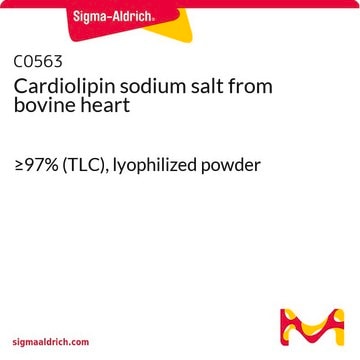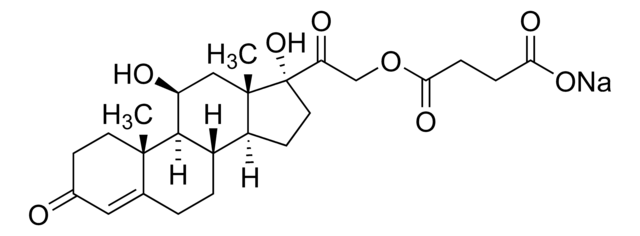P4279
L-α-fosfatidilcolina
egg yolk, Type XIII-E, 100 mg/mL in ethanol, solution
Sinónimos:
1,2-Diacil-sn-glicero-3-fosfocolina, 3-sn-Fosfatidilcolina, L-α-lecitina, Azolectina, PC
About This Item
Productos recomendados
origen biológico
egg yolk
Nivel de calidad
tpo
Type XIII-E
Análisis
≥99% (TLC)
formulario
solution
concentración
100 mg/mL in ethanol
grupo funcional
phospholipid
tipo de lípido
phosphoglycerides
temp. de almacenamiento
−20°C
InChI
1S/C42H80NO8P/c1-6-8-10-12-14-16-18-20-21-23-25-27-29-31-33-35-42(45)51-40(39-50-52(46,47)49-37-36-43(3,4)5)38-48-41(44)34-32-30-28-26-24-22-19-17-15-13-11-9-7-2/h14,16,20-21,40H,6-13,15,17-19,22-39H2,1-5H3/b16-14-,21-20-/t40-/m1/s1
Clave InChI
JLPULHDHAOZNQI-ZTIMHPMXSA-N
¿Está buscando productos similares? Visita Guía de comparación de productos
Categorías relacionadas
Descripción general
Aplicación
Acciones bioquímicas o fisiológicas
Palabra de señalización
Danger
Frases de peligro
Consejos de prudencia
Clasificaciones de peligro
Eye Irrit. 2 - Flam. Liq. 2
Código de clase de almacenamiento
3 - Flammable liquids
Clase de riesgo para el agua (WGK)
WGK 1
Punto de inflamabilidad (°F)
60.8 °F
Punto de inflamabilidad (°C)
16 °C
Equipo de protección personal
Eyeshields, Faceshields, Gloves, type ABEK (EN14387) respirator filter
Certificados de análisis (COA)
Busque Certificados de análisis (COA) introduciendo el número de lote del producto. Los números de lote se encuentran en la etiqueta del producto después de las palabras «Lot» o «Batch»
¿Ya tiene este producto?
Encuentre la documentación para los productos que ha comprado recientemente en la Biblioteca de documentos.
Los clientes también vieron
Nuestro equipo de científicos tiene experiencia en todas las áreas de investigación: Ciencias de la vida, Ciencia de los materiales, Síntesis química, Cromatografía, Analítica y muchas otras.
Póngase en contacto con el Servicio técnico









